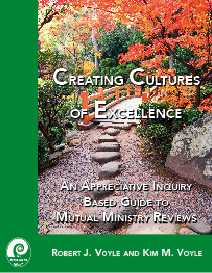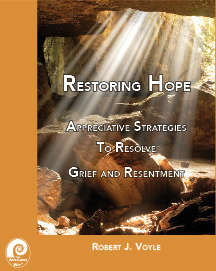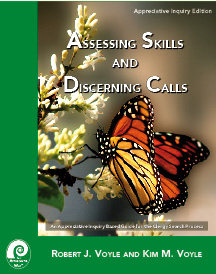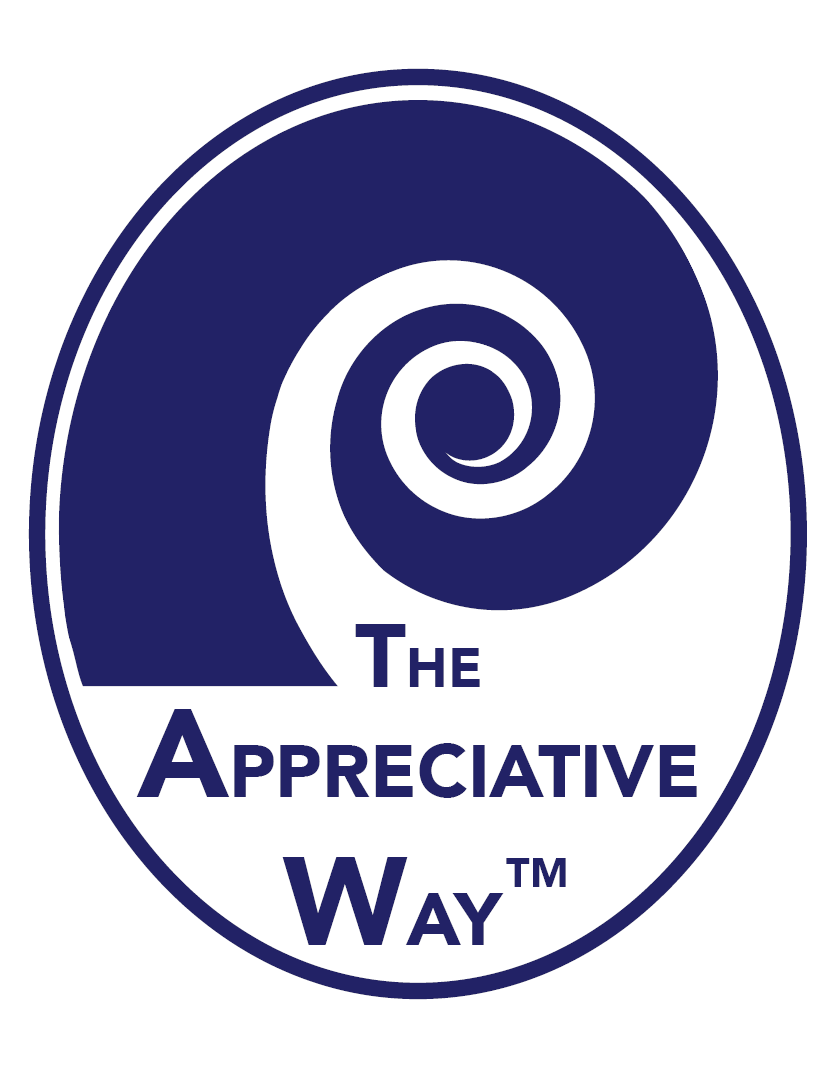

The Appreciative Way
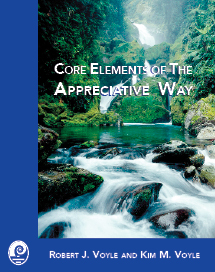
Discover the essentials of the
Appreciative Way in this fast
read format book by
Rob and Kim Voyle.
Creating Cultures
of Excellence
Appreciative Inquiry Based Guide to Mutual Ministry Reviews
- Templates and Worksheets
- For Congregations
- Individual Performance
- Coaching Strategies
Restoring Hope
Practical Appreciative Inquiry based strategies to effectively resolve grief and resentment.
Welcome to Yes!3
Yes!3 is designed to help you
grow an appreciative culture
within your congregation by
helping parishioners create
a purpose centered life
in which they can say:
Yes! To God
Yes! To Their Neighbor
Yes! To Them Self
Clergy Search Resource
Over 380 pages of detailed strategies to Assess clergy skills and Discern Calls.
Now available as an online library.
Stay Connected
Receive The Appreciative Way our Free Email Newsletter
and receive advance notice of future programs.
Privacy: We never rent, sell, or share your email.
Training in The
Appreciative Way
All of our Coaching, Ministry and Leadership training programs are based on the Appreciative Way.
We offer a blend of residential intensives and teleconferences to train you to appreciatively use your gifts for the benefit of others.
The Clergy Coach
The Rev. Dr. Rob Voyle is a leader in the development and use of appreciative coaching in his work with clergy.
Appreciative Coaching
Our appreciative way of coaching uniquely blends Appreciative Inquiry, the work of Milton Erickson, and Contemplative Spirituality.
Coaching Services
We provide Appreciative Coaching for a variety of purposes. For more information see:
Coach Training
We offer a blend of residential intensives and teleconferences to train you to appreciatively use your gifts for the benefit of others.
>>
Appreciative Coach Training
What Participants Say
Rob will enhance your ability to delight in yourself, your neighbor and God through his insightful, practical, loving, professionally grounded, appreciative and often mischievous coaching and
teaching skills; and that will make you a better leader and citizen in God's creation.
Ed Leidel, Episcopal Bishop and Congregational Coach serving North America
"I have been fully engaged emotionally, intellectually, and spiritually. Thank you for touching me at the core of my being."
M.E. Member of the UCC Church.
"Of all the training I have been to, your notes are the ones I keep coming back to time and again for practical resources."
P.W. Conference Pastor.
Rob's training is full of heart, wit, and passion.
E.R. Executive Coach
Rob's educational model brings body, mind and spirit together. I have been challenged intellectually, transformed spiritually, touched emotionally, gathering in communally. He came into my life at just the right time.
Jean Holmes, Presbyterian Pastor
Rob's appreciative coach training helped me to rethink the way I approach and provide
therapy; Thanks!
Dr. George Moses, Pastoral Counselor
After 45 years in the pastoral ministry and attending three events led by Rob Voyle, I have finally learned a better way to help church leaders help themselves and the people they serve.
John Wilkerson, Director: Church Leadership Coaching & Consulting
Rob's combination of organizational savvy, teaching skills, theological & spiritual integration, and ability to rapidly build supportive, learning communities is quite simply the best in any of
the churches today.
Gray Temple, Episcopal Priest, Author & Coach
Appreciative Tips
The following tips were presented in the Clergy Leadership Institute's occasional newsletter The Appreciative Way.
Additional tips can be found at the Appreciative Way Blog
- View the most recent Appreciative Way newsletter
- All Sustainable Change is an Inside Job:
Practicing Incarnational Leadership - Appreciatively Thinking about Lent and the Ten commandments
- The Power of Great Questions
- Lent and an Appreciative Approach to Repentance
- Get Feed-Forward not Feed-Back
- Forget Balance, Get Integrated!
- Growing Leaders Through Intentional Coaching
- Thinking and Acting Like a Leader
- Ensuring Change is a Blessing
- Go beyond positive to Life-Giving this Easter
- Thinking about Lent, Sin, and Grace
- The Importance of Understanding Your Purpose
- Easter is about New Life, it is not about having less death.
- Creating a Better World
- Personal Motivation: Finding the Fire Within
- Motivating Others: Seeking the Fire Within
- Preaching: Incarnate the Message
- Transforming Problems into Solutions
The Power of Great Questions
David Cooperrider, the founder of appreciative inquiry, said that organizations grow in the direction of the questions they ask. Every time we ask a question of someone we influence or move the person or group in some direction. If these two statements are true and from my experience they are, then it pays to ask questions that move people in the direction we want them to go. For example if we want the group to move toward success, we need to ask questions about how they succeeded in the past, and what they want to accomplish in the future.
On the other hand if we ask a group what problems they are having, the people will be moved in the direction of problems and causality. This evokes blame and judgment which in turns creates defensiveness on the part of those who feel blamed. The end result is that members of the group will have been moved into a realm of greater alienation and powerlessness. Even if the problem solving question is asked with a minimal sense of blame, over time this problem centered approach will result in an erosion of confidence and well-being and leave people feeling powerless and immersed in their problems.
The appreciative approach of asking what is working and what would "more" look like continually moves people into a realistic and empowered hope for a better future. As Cooperrider has also said: "we need to inquire into and discover the root cause of success rather than the root cause of failure." When confronting a problem we need to get clear on what a successful outcome would be and then explore what resources we need to achieve it, rather than focus on why we can't achieve the goal.
Here are some of my favorite questions:
- What is it that you really, love to do?
- What would happen to your life if you got to do more of what you really love to do?
- What do you need in order to do more of what you love?
Notice we don't inquire why you can't do more of what you love, but what do you need to do what you love.
What would happen to your church if it stopped doing what it "should do" and simply became a place to support people to do what they really love to do?
To live in love and to share love is our heritage as the children of God. To grow communities of love we need to inquire deeply into our experience of love and sharing that love with others.
[ TOP ]
All Sustainable Change is an Inside Job:
Practicing Incarnational Leadership
Christmas and Easter are the two church celebrations that the church generally does very well. What we often don't do very well is practice the incarnation in our daily ministry. What I often observe in failed change processes is a failure of the incarnation. Instead of growing the change from within the community the change is inflicted on or imposed upon people. Regardless of the intent of the person imposing the changes, such imposed changes are likely to be perceived as a violation of a person's integrity and resisted.
To ensure that our changes are likely to be accepted and sustained over time we need to join the community and from amongst the people grow changes that express the life giving-core of the community. The best way I know to join a congregation is to ask and discover what the community really values and finds life-giving. Intentionally growing these values and life-giving qualities will be perceived and welcomed as a blessing.
Jesus did not come and inflict salvation on us, he came and lived as one of us.
That God was willing to come and live as one of us in Jesus shows us God's incredible valuing and radical acceptance of humanity. From his sharing in our humanity Jesus offers us life and not just any life but abundant life as the children of God.
In the Appreciative Way we make joining people where they are the first step in all change work. It is deeply respectful and allows both the leader and community to co-create with God their desired future.
For further details on how this incarnational approach is used when working with others please see the appreciative way
[ TOP ]
Appreciatively Thinking about Lent and the Ten commandments
Many years ago I was an altar boy and was given a devotional book to prepare myself to receive Holy communion. In the self-examination there was an expanded version of the Ten Commandments with long lists of potential sins I could have committed. Many of them were new to me and I had to look them up in a dictionary to make sure I understood what I should be trying hard not to do - and some of them were really weird and kinky and put strange ideas in my head.
Sadly telling me what sins to avoid didn't help me learn how to love others and seek justice in the world. It kept me a sinner, fearfully preoccupied with my own salvation rather than being concerned for either the temporal or eternal salvation of others.
Several years ago a coaching client was looking for a Lenten discipline and was considering taking two of the Commandments each week and reflecting on how he had failed to keep them. My suggestion to him was to take two commandments each week and reflect on how: keeping these commandments had been a blessing in his life and in the lives of those he loved. In the process he was also able to discover the things that had empowered him to keep the commandments and how to live them as a blessing.
In the Godly Play curriculum the Commandments are described as the "ten best ways to live." If our goal is to live the Commandments and not just keep them, then we need to reflect on how they are a blessing and what enables us to keep them rather than making them a fear based burden of obligation and discouragement devoid of any power or blessing.
Three Lenten Questions
- How has keeping this commandment been a blessing in my life and in the lives of my neighbors?
- What enabled me to keep the commandment?
- Where would I like, and what can I do, to grow this blessing?
[ TOP ]
Lent and an Appreciative Approach to Repentance
Repentance is about turning from one course of action to another. Repentance is fundamentally about making changes. We can use the 3Rs of repentance to understand the mechanism of change and the elements that people need to consider when making changes.
Recognize: That we are doing something we don't want to do.
Without awareness we will never recognize our need to change.
Regret: Being conscious of the cost to others and ourselves of our actions.
If we don't truly regret our actions we will not change.
Reorient: Turning from what we don't want, to what we do want.
If we continue to focus our attention on what we don't want we will persist in that behavior.
Failure to complete a desired change is usually the result of a failure of one of the repentance steps. In my experience, when coaching people, the most important though is the reorient step. Many of us can recognize and regret our undesired actions but the harder we try to stop the undesired behavior the more we remain stuck, just as St. Paul reports in his letter to the Romans. Staying focused on the undesired behavior prevents us from reorienting to the desired behavior. During Lent if we only focus on what we don't want parishioners to be doing we will ensure they keep doing them. What we must do is reorient them to the call of the Good News.
Similarly if the focus of Lent is self-denial and learning to say no, we will never discover grace and the new life that Jesus comes to offer. In our congregational study program Yes!3 we help parishioners discover what is truly life giving to them and how they can orient their lives around what they discover thus facilitating genuine repentance.
Any "no" or act of self-denial in the spiritual life
is only as helpful as the deeper "Yes" that the no allows.
[ TOP ]
Get Feed-Forward not Feed-Back
Are you tired of unproductive ways of helping people to change?
Despite giving them lots of feedback they just keep doing what they are doing?
Or do you find that when people want to give you constructive criticism it rarely feels constructive?
If you answered yes to any of these questions then consider getting or giving feed-forward rather than feedback to the people that you work with.
Feedback is a critique or judgment about something we did in the past. It can be positive or negative, but research shows that neither positive or negative feedback is very helpful in actually getting people to change their behavior. Knowing how you messed up doesn't help you know what to do differently. Most of the time unsolicited solicitude is just a trespass and feedback leads to defensiveness rather than excellence.
While feedback doesn't help people change, research does show that feed-forward is helpful in helping people to change. Feed-forward is information about what to do differently in the future to ensure success. If people want to criticize your work don't let them go until they give you specific feed-forward as well.
When assessing outcomes we ask two questions:
What was valuable in what we did?
What would make it more valuable in the future if we were to do it again?
The first question provides feedback. The second seeks feed-forward. Asking these two questions orients us to growing in excellence rather than wallowing in and replicating past failure.
[ TOP ]
Forget Balance, Get Integrated!
Many people seek coaching to achieve balance, such as balance between their personal and professional lives. However seeking balance is a guaranteed way of living in a state of tension, pulled between the two different demands. This state of tension also leads to continual worry and vigilance over whether one or other of the demands is being neglected. Similarly, church leaders often get caught in the midst of trying to balance the competing demands of their congregational programs. If you seek balance you will not have peace.
Rather than seeking balance we need to integrate our lives around our core life-giving purpose. This is the place where we can simultaneously say Yes! to God, our Neighbor, and Our Self. It is the life-giving hub which energizes all aspects of our lives, bringing peace, harmony, and passion to all that we do. In congregations the Church's core purpose is the hub from which each church activity derives its specific purpose. Without a commitment to a unified vision the church dissolves into series of life-draining competing entities.
"Getting integrated" requires that both individuals and groups know their core purpose. Central to all of our appreciative training programs is a focus on helping participants use appreciative strategies to discern and manifest their core purpose.
[ TOP ]
Growing Leaders Through Intentional Coaching
The purpose of leadership is not to create followers it is to create more leaders who are committed to the vision. Leaders are dependent on others for their success. If you are not dependent on others for your success then you are not leading anyone.
A core task of leadership is to help a community establish a clear, compelling, relevant, well articulated purpose. Another important task of leadership is to grow more leaders who can enable that vision to be fulfilled. People don't develop leadership skills in a vacuum. Think about you weekly schedule. How much time is spent in coaching your leaders through intentional conversation, modeling and mentoring. If you are frustrated that your leaders "don't get it" perhaps you "haven't given it." What do you need to delegate or stop to create time to coach your leaders? Delegating and not doing everything myself was and is one of my toughest challenges as I made the transition from pastoral counselor to leader.
David Gortner, a clergy effectiveness researcher has discovered that the one factor that was predictive of clergy effectiveness many years after ordination was the quality of the mentoring they received in the first 3 years after their ordination. Yet his research also suggests that what newly ordained clergy wanted, and didn't often get in their coaching, was specific leadership skill development. See "Mentoring Clergy for Effective Leadership" in the journal Reflective Practice: Formation and Supervision in Ministry, Volume 27, 2007.
Our experience suggests that leadership is best learned "on the job" through a combination of training seminars and coaching. Because we are committed to growing leaders and know the power of coaching leaders we put considerable emphasis on both learning leadership competencies and learning coaching competencies. A full listing of our training programs can be found at Training Schedule.
[ TOP ]
Thinking and Acting Like a Leader
Can your average parishioner tell you in 30 seconds or less what the mission of your church is?
For the past 50 years in the mainline church our applied theology for clergy has been chaplaincy training. It is great stuff, and is part of my personal heritage that I deeply value. What it did, was equip me to care for individuals as they experienced the trials and tribulations of life. What pastoral counseling and chaplaincy training didn't do was equip me to be a leader - to lead a group of people to accomplish a mission. While I was equipped to "walk with" individuals I was not equipped to lead a group of people to make a difference in their world. If we want to go from maintenance to mission and grow our churches then we will need to move from being chaplains of our congregations to leaders of our congregations. Please don't get me wrong, I think chaplains can be leaders, and I think the church is still in need of chaplains and their ministry but the "captain" of the congregation needs to be more than a chaplain, the "captain" needs to be a leader.
One of the first tasks of the leader is to help the community establish a clear, compelling, relevant, well articulated purpose, and once that purpose is established to continually remind the community what it is. In 25 years of doing church consultation, parishioners from only two churches have been able to tell me what their mission is. Not surprisingly they are both growing dynamic places. The fact that parishioners from other churches couldn't tell me their mission was not their failure, but a failure of leadership. Learning about Appreciative Leadership and managing change transformed my congregational ministry. It inspired me to start the Clergy Leadership Institute, to share with others what I have learned and what I believe the Church needs to meet the challenges of our day.
[ TOP ]
Ensuring Change is a Blessing
Psychologist Stephen Gilligan, says that "People don't want to be changed they want to be blessed." One of the main reasons why people resist change is because they do not perceive the change will result in a blessing - an outcome state that is of greater value than they currently have. In many cases people resist change because they perceive the outcome to be of lesser value. The rich young ruler who asked Jesus what he needed to do to have eternal life could not perceive that following Jesus was more valuable than his current wealth. Even self-sacrifice is based on the belief that there is a greater reward to the person offering the sacrifice. To be sustainable, change must also be a blessing to all and not just some. Any blessing that comes to us at the unwilling expense of someone else is not a blessing it is theft and it will be resisted and will not be sustainable.
In the Appreciative Way we explore what people deeply value about themselves and their church to ensure that any proposed change will be a genuine blessing by adding value to their lives and their community as a whole.
[ TOP ]
Go beyond positive to Life-Giving this Easter
Many people accuse appreciative inquiry of being too positive. Personally it is not that important to me whether something is positive or negative for that is simply a judgment based on someone's value system. Beyond ideas of positive or negative, what I am interested in and what I believe Jesus is interested in is life and joining in that which is life-giving. The Light of the World is far beyond a feel-good, positive glow in the universe; it is the Life of the Universe. In our appreciative inquiry training we teach people how to discover what is life-giving in individuals and in their organizations and how to orient activity purposefully around that life-giving core. We teach people to discover and live in the Easter new-life, a life that flows their God-given purpose, a life which transcends ideas of positive or negative.
Easter is not just a positive experience
Easter is the Life-Giving Yes! from
God that echoes through the Universe.
[ TOP ]
Thinking about Lent, Sin, and Grace
Many people at our appreciative inquiry training programs, because of its very positive approach, ask what is an appreciative inquiry understanding of sin. While we take sin seriously, we take growing in grace even more seriously and make that the focus of our attention. We don't try to reduce the presence of sin directly, for that leads to St. Paul's conundrum in Romans, where the harder he tries not to sin the worse it gets. What we focus on is grace and how we can grow in that, and discover like St. Paul that where grace abounds, sin cannot.
When Jesus healed the blind man he refused to entertain ideas about the origins of sin and whose sin caused the man to be blind. He focused instead on the grace of God that was to be manifested in the man's healing. The traditional focus during Lent has often been on reflecting on the commandments and how we have broken them, which just makes us experts on sin, which can be very demoralizing and not lead to a grace filled life. An appreciative approach would be to also reflect on the times that we have kept the commandments, what enabled us to keep the commandments, and how that has been a blessing in our lives and in the lives of our neighbors.
"Jesus didn't come that we might have less sin and death,
he came that we might have life,
and share it abundantly with our neighbors"
[ TOP ]
The Importance of Understanding Your Purpose
"You have to be really careful if you don't know where you are going because you might not get there." Yogi Bera
One of the critical things I have discovered since learning of appreciative inquiry is how important having a clear sense of purpose is both to healthy individuals and congregations. Our experience of dynamic congregations, that are growing both spiritually and where possible numerically, suggests that one of their common factors is that they all have a clear sense of purpose that is regularly articulated in all that they do. Congregational life and vitality occurs at the cross roads of the church's purpose and the individual member's purpose. Congregational vitality occurs to the extent that the purpose of the church resonates with the purpose of the individuals and vice versa. Yet what we have discovered is that very few people can clearly state their personal purpose or their church's purpose. In their aimlessness they often become apathetic, passionless, or conflicted over trivialities. In our coach training we teach people how to use the appreciative process to help both individuals and congregations to explore their best to discover their unique purpose for it is at our best that we most closely manifest the image of God that we were created to be. Our goal is to help people to create a purposeful life in which they can say Yes! to God, Yes! to their neighbor, and Yes! to themselves, for life can only be found in what we deeply affirm or say Yes! to.
[ TOP ]
Easter is about New Life, it is not about having less death
The Easter life follows the genuine repentance of the Lenten Season.
Repentance has three components. A failure to make genuine change and transformation is because we have failed at one of the 3Rs of repentance:
Recognize: That you are doing something you don't want to do.
Without awareness we will never recognize our need to change.
Regret: Being conscious of the cost to others and ourselves of our actions.
If we don't truly regret our actions we will not change.
Reorient: Turning from what we don't want, to what we do want.
If we continue to focus our attention on what we don't want we will persist in that behavior.
The failure to reorient is one of the primary causes of why people don't achieve the change they want in their life. It keeps them trapped in the pain of regret, trying to do less of an unwanted behavior which in turn is a guaranteed way of maintaining that behavior in focus and ensuring that it will persist. Reorientation occurs when we turn our attention to what it is that we do want and orient our life around that preferred behavior. Appreciative Inquiry is a powerful way of helping individuals and organizations to orient around what they would prefer rather than orienting people around having less of what they don't want. The appreciative way is about living in the New Life of Easter.
[ TOP ]
Creating a Better World
To create a better world we don't need better people we just need to help people be at their best. David Cooperrider, the founder of Appreciative Inquiry puts it this way: "Organizations are centers of human relatedness, first and foremost, and relationships thrive where there is an appreciative eye — when people see the best in one another, when they can share their dreams and ultimate concerns in affirming ways, when they are connected in full voice to create not just new worlds but better worlds."
In our training programs we use experiential appreciative exercises to not only teach the program content but help participants discover themselves at their God given best and to share that best with the world.
[ TOP ]
Personal Motivation: Finding the Fire Within
If you haven't found the place deep inside where you cannot not do ministry keep looking for what you cannot not do and go do that. If you don't, you will simply waste your God given potential, rob society of your gifts and just make yourself and the world around you miserable.
In our training programs we use experiential appreciative exercises to not only learn the program content but help participants discover those things they do that result in a deep God given sense of satisfaction and fan the fire of their passion for ministry. Here is what Miriam Erickson, a recent participant said about our appreciative inquiry program:
"I have been fully engaged emotionally, intellectually and spiritually.
Thank you for touching me at the core of me being."
[ TOP ]
Motivating Others: Seeking the Fire Within
I often hear leaders saying I am going to "light a fire" under an employee or group of people. In my experience when you try to light fires under people all you get is burnt butts rather than sustained growth and development. A much more enlightened way to motivate people is to find the fire within them and fan it. The appreciative way discovers the fire within organizations and individuals and orients this passion around the pursuit of shared goals.
[ TOP ]
Preaching: Incarnate the Message
I often hear clergy say that they preach best when they manage to get out of the way of the message. This doesn't make much sense to me, because clearly the best way to get out of the way of a sermon is to stay in bed on Sunday. I think good preaching is really about how we get in the way of the message or how we incarnate the message. When we look at the Gospels we can clearly see the unique finger prints of the authors. We can see how John gets in the way of his Gospel and how Matthew gets in the way of his Gospel. Likewise your parishioners can identify how you get in the way of your Gospel. It is only when you fully show up in the pulpit and incarnate your message that your preaching has life and is life giving.
In our training programs we use experiential appreciative exercises to not only teach the program content but help participants discover their unique God given humanity so that they not only have new skills to use, but can fully incarnate their Gospel.
David Cooperrider the founder of Appreciative Inquiry describes the process like this: "Think of Appreciative Inquiry as a new conversation, as a search engine for the positive core of a system, as a convergence zone or "space" creating a multiplier effect in the area of human imagination and intellectual capital."
[ TOP ]
Transforming Problems into Solutions
It is impossible to work effectively on a negative goal such as trying to be less anxious, or reduce conflict. Appreciative Inquiry teaches that: "what we focus on becomes our reality" The harder we try to reduce conflict the more conflicted we become.
The first step in transforming problems into solutions is to create a positive goal of what we want to be doing or have happen. We can walk backwards into the future trying to avoid what we don't want, but it is way more fun and fulfilling to turn and embrace the future we desire.
[ TOP ]
